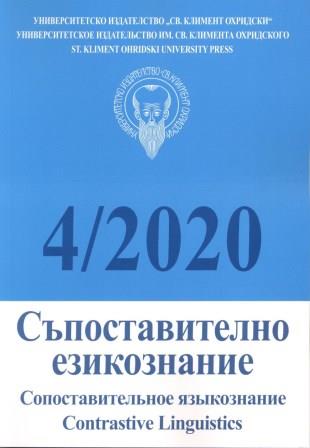Ролята на прагматиката и контекста при развитието на перфектни конструкции със съм и имам английски и български език
The role of pragmatics and context in the development of perfect constructions with съм (sâm, ‘be’) and имам (imam, ‘have’) in English and Bulgarian
Author(s): Bozhil HristovSubject(s): Language and Literature Studies, Foreign languages learning, Theoretical Linguistics, Philology, Translation Studies
Published by: Софийски университет »Св. Климент Охридски«
Keywords: perfect; grammaticalisation; pragmatics; English; Bulgarian
Summary/Abstract: This paper discusses the development of perfect constructions with be and have in English and Bulgarian. Special attention is paid to the competition between be and have in English, resulting in the ultimate demise of be as a perfect auxiliary, as well as to the rise of new have-perfects in Bulgarian. Various functionalist hypotheses have been put forward in order to explain these processes. Upon closer examination, however, it emerges that functional phenomena under investigation. Rather than being avoided, ambiguity is either resolved or it does not matter in context. It appears that earlier scholars might have put so much emphasis on such functional considerations due to a bias in favour of written language, where editing and clarity of expression are more important. If spontaneous spoken language is seen as primary, it becomes clear why the availability of more than one reading was not detrimental, but instead fostered the (re)emergence of cross-linguistically similar grammaticalised constructions, as well as their interchangeability, due to natural inferences in the course of communication, leading to bleaching and shifts of meaning/usage. Once the central role of pragmatics, including inference in context, is recognised (as is traditionally done in grammaticalisation studies), the phenomena receive a more plausible explanation.
Journal: Съпоставително езикознание / Сопоставительное языкознание
- Issue Year: 2020
- Issue No: 4
- Page Range: 7-17
- Page Count: 11
- Language: Bulgarian

